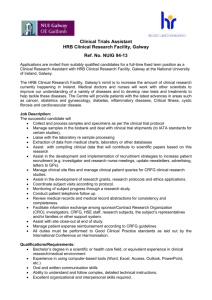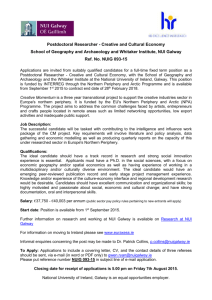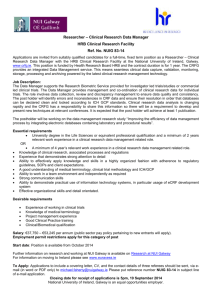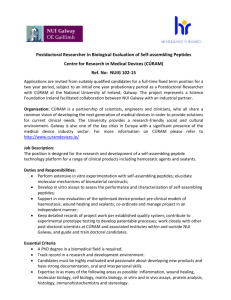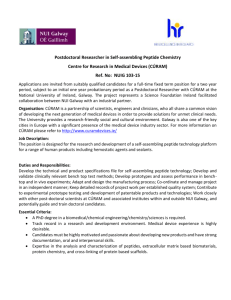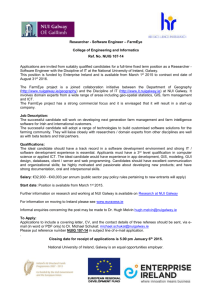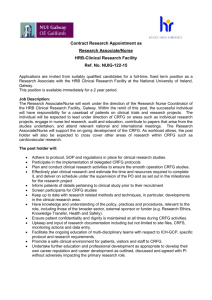Submission in relation to the proposed development of a National
advertisement
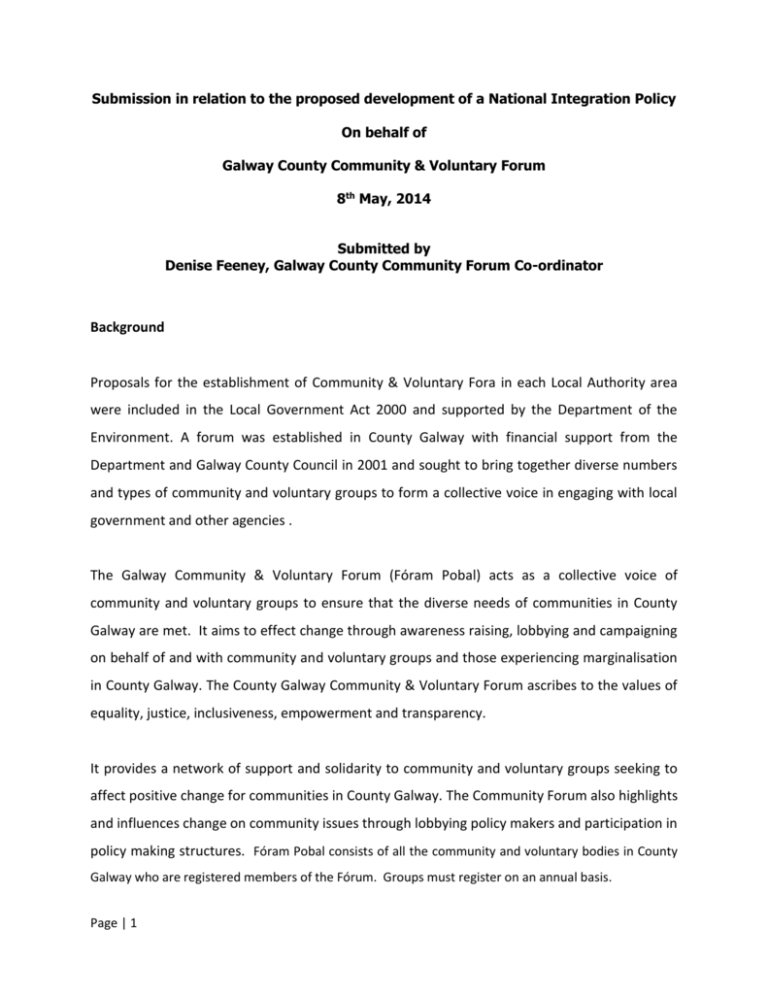
Submission in relation to the proposed development of a National Integration Policy On behalf of Galway County Community & Voluntary Forum 8th May, 2014 Submitted by Denise Feeney, Galway County Community Forum Co-ordinator Background Proposals for the establishment of Community & Voluntary Fora in each Local Authority area were included in the Local Government Act 2000 and supported by the Department of the Environment. A forum was established in County Galway with financial support from the Department and Galway County Council in 2001 and sought to bring together diverse numbers and types of community and voluntary groups to form a collective voice in engaging with local government and other agencies . The Galway Community & Voluntary Forum (Fóram Pobal) acts as a collective voice of community and voluntary groups to ensure that the diverse needs of communities in County Galway are met. It aims to effect change through awareness raising, lobbying and campaigning on behalf of and with community and voluntary groups and those experiencing marginalisation in County Galway. The County Galway Community & Voluntary Forum ascribes to the values of equality, justice, inclusiveness, empowerment and transparency. It provides a network of support and solidarity to community and voluntary groups seeking to affect positive change for communities in County Galway. The Community Forum also highlights and influences change on community issues through lobbying policy makers and participation in policy making structures. Fóram Pobal consists of all the community and voluntary bodies in County Galway who are registered members of the Fórum. Groups must register on an annual basis. Page | 1 Galway County Community Forum and Integration Galway County Community Forum has always been active in the field of social inclusion in County Galway, hosting conferences and seminars on matters relating to specific target groups and providing inputs and submissions to policies affecting those who are socially excluded. The Fóram Pobal, through either it’s co-ordinator, or other voluntary members of it’s executive committee has played an active role in the activities and priorities of the Social Inclusion Measures Committee (SIM)of the County Development Board. In 2008, in reviewing it’s priorities, the SIM Committee identified the needs of Ethnic Minorities and Migrants as one it’s priorities for action in the following period. A sub-group of the committee was formed in order to bring agencies and organizations together to develop an Integraton and Diversity Strategy for County Galway. Galway Community Forum was one of the core groups involved in this committee, and also provided a lead role in the development of the Strategy in relation to one of the key themes of the Strategy “Community Participation”. In 2009, Galway County Council was successful in applying for, and being awarded funding from the Office for the Minister for Integration for the research into, and the development of an Integration Strategy for the County, and as a part of this, the Community Forum undertook the task of assisting with the establishment of a Migrant’s Forum for the County. This forum, which was established in August 2011, and is now called the Galway County Intercultural Forum, has since been supported by both the Community Forum and other staff in the Community and Enterprise Unit of Galway County Council. Based on the experience gained by the Forum executive, the learning for members of the community forum, and the consultations and joint activities that have been undertaken between Community Forum and Intercultural Forum members, the Community Forum wishes to make the following observations / recommendations in regards to any future Integration Strategy for the Country. Page | 2 Galway County Integration and Diversity Strategy In Galway County, groups and agencies locally already sitting together with an interest in Social Inclusion had identified the importance of Integration as a key social inclusion area. However, the availability of a fund at national level that could be accessed by the Council, to deliver both a strategy and some related ancilliary activities in support of that strategy through a dedicated funding stream, was invaluable in taking that work forward. The Strategy is the result of an energetic effort by the people and service providers of Galway County to address the significant demographic changes that have taken place throughout the County over the past decade or more. Like the rest of Ireland, there has always been diversity within County Galway, with a large Traveller population and various religious faiths. This diversity was not always named and recognised. However, with recent immigration and emigration trends, diversity of culture, languages, religion and traditions have become more visible and led to the need to increase understanding, awareness and respect of cultures. The Irish economy, like the population, has dramatically changed in the last several years. Economic cutbacks in all public and community services, demanding mergers, heavy workloads, and overstretched staff resources, have impacted upon the level of service that can be provided, often affecting the most vulnerable members of our society. Some of the organisations who were heavily involved in the support of ethnic minorities at the outset of this Strategy, such as Galway Refugee Support Group (GRSG), no longer exist, due to funding being discontinued, while Dún Gibbons Direct Provision Accommodation Centre has closed. As integration is a two way process, the County Strategy is for everyone living and/or working in County Galway with a particular focus on integrating minority ethnic communities. The strategy addresses the need for change across a wide variety of areas of the public service including in the provision of education and in creating role models in tutors, educators and facilitators from ethnic minorities and newly settled communities in Ireland; the need for changes in the way health and other public services deliver and configure their services to meet diverse language, cultural and religious needs; the lack of expertise in the delivery of information services at community level, especially outside of the major Page | 3 towns and cities; and the lack of opportunities for employment for people whose work experience and qualifications were gained outside of Ireland. One of the most strongly expressed prevailing views coming from the consultation processes which were engaged in as part of developing the Integration and Diversity Strategy for County Galway, was that above all else, the migrants and ethnic minorities consulted with wanted to maximize the opportunities to interact with their Irish neighbours, fellow workers, fellow residents and the community at large, as integration was felt to be a sense of “belonging” in the community that is built up and developed as a result of many and diverse opportunities for interactions between people from different communities and ethnic backgrounds. For these reasons, the representatives brought together to form a Migrants Forum were very strongly of the view that they wished this to be an Intercultural Forum and that there should also be Irish people represented on it. They also wished the Forum to address the critical issues facing those in the Asylum system, such as those in Direct Provision, those who are struggling with the aftermath of leaving Direct Provision and also the plight of those affected by loss of work permits or facing exploitation from unethical employers. Recommendations for the future National Integration Strategy 1.A National Integration Strategy should set out how integration might work in practice drawing on best practice in other countries, and offering specific recommendations for all Departments of Government and in relation to minimum standards of service and treatment in every avenue of public service. 2.The government should consider some mechanism for the encouragement of diversity in employment when any new recruitment / training processes for the public service are put in place to attempt to ensure that there is a better reflection of the ethnic diversity in the population in the public services which serve that population. 3.Consideration should be given to how the Irish language and specific religious requirements for teacher training education may militate against a more diverse teacher population and the importance of changing this proactively to provide more role models in our schools of teachers from ethnic minority backgrounds. Page | 4 4.The provision of a greater variety of languages as part of the Leaving Certificate curriculum should be investigated, and methods whereby young people who speak other languages as their first language but are dispersed across various locations eg as in a rural County or in smaller towns, could be supported to follow a supervised curriculum perhaps through online clusters of learning. 5.Any national Integration Strategy should have as its starting point the review of the status and priorities already identified from the large body of work and consultation already completed or underway in many Counties as part of the local process of developing Integration Strategies. 6.Funding should be made available at a central level for both Local Authorities and also for reputable community and voluntary bodies, including established Intercultural and Integration Forums, to sustain and develop their work and to provide expertise on the ground in local areas. 7.Government should underpin it’s commitment to fund Local Integration Strategies, Local Authorities and a network of specialist NGOs or local integration/intercultural forums, by putting in place a national system or structure for the support of the Integration work being carried out in the local areas. This could involve, inter alia: The provision of guidance in relation to good practice Agreed systems for monitoring and evaluation of actions / activities in support of integration 8.Government is presently engaged in a process of realigning supports for Social Inclusion work and Local and Community Development and also in the requirement to establish Public Participatory Networks (PPNs) in each Local Authority Area to provide the mechanism for participation and representation of all types of community and voluntary effort into various statutory decision making frameworks. The new Integration Strategy should address as a matter of urgency how the needs of ethnic minorities and migrants could be met within such structures, particularly in circumstances where groups are organised at a level that does not correspond to the Local Authority area. Page | 5 9.It is important that within the Strategy for Integration there is a focus on giving support to the regions which have suffered unduly from the withdrawal of all government support for integration work in recent years, and that both specialist “expertise” in relation to migration and integration issues be supported as well as fostering strong links between these structures and the more generic community development and community participation networks and structures on the ground to ensure that there is a culture of mutual support between the specialist and generalist structures for participation and community development. Page | 6
